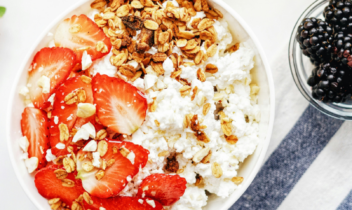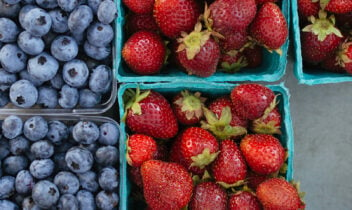TheBUZZ Fruits and vegetables can increase your chances of fertility?
WHAT THEY’RE SAYING
Lycopene, folate and vitamin C, which are found in fruits and vegetables, have been associated with increased fertility odds.
WHAT WE KNOW
With fertility treatments on the rise, research has been booming with ways to help society increase their baby-making odds. Recent studies have found that folate, vitamin C and lycopene (which are found in fruits and vegetables) may enhance a man’s virility.
Folate is extremely important during times of rapid cell growth and cell division in your body. Folate is necessary for fertility in both men and women. In men, it contributes to sperm cell maturation.
In women it contributes to the creation of the egg, helps the egg adhere to the uterus during the early stages of pregnancy, and aids in the formation of the placenta. Therefore, both men and women can benefit from adequate folate consumption. Folate is found in many fruits and vegetables including asparagus, broccoli, strawberries, lima beans and chick peas ( See More). Lycopene and vitamin C are also important to sperm health due to their antioxidant qualities. Lycopene is found in tomatoes, carrots, watermelon, pink grapefruit and many other red-colored fruits and vegetables. And vitamin C can be found in a variety of fruits and vegetables.
HOW DO WE KNOW THIS?
A recent study in the journal Fertility and Sterility followed 61 subjects that were attending a fertility clinic. The study found that a low intake of antioxidant nutrients was associated with a poor semen quality. The study found that the subjects who ate a higher amount of carbohydrates, fiber, folate, vitamin C, and lycopene were found to have a healthier sperm profile.¹
Another study published in the same journal supplemented 211 men with zinc and folic acid for 26 weeks. The study found that sperm count increased 74% in men who had been classified as subfertile (less fertile than a typical couple) after combined zinc and folate supplementation.²
While both of the studies do not provide conclusive evidence, their findings have opened the doors to new research related to increasing fertility odds in subfertile couples.
OUR ADVICE
Human research is scarce concerning fertility; therefore, more studies need to be done to determine the nutritional link between fertility and nutrients in fruits and vegetables. But what we do know is:
- Folate is essential for the promotion of healthy growth of embryos in females.
- Antioxidants protect the body (including sperm) by attaching to and removing free radicals that can cause damage.
Therefore, while more evidence still needs to be done to determine if key nutrients in fruits and vegetables can prevent subfertility, we do know that fruits and vegetables do more good then harm when it comes to your health! So enjoy all forms of fruits and vegetables every day. It’s easy to meet your recommendations if you focus on making half your plate full of fruits and vegetables!
¹ Mendiola, J, et al. “A Low Intake of Antioxidant Nutrients is Associated with Poor Semen Quality of Patients Attending Fertility Clincs.” Fertility and Sterility (2010). 93(4): 1128-33.
² Wong, W, Y, et al. “ Effects of Folic Acid and Zinc Sulfate on Male Factor Subfertility: A Double-Blind, Randomized, Placebo-Controlled Trial.” Fertility and Sterility (2002). 77(3): 491-8.
|


